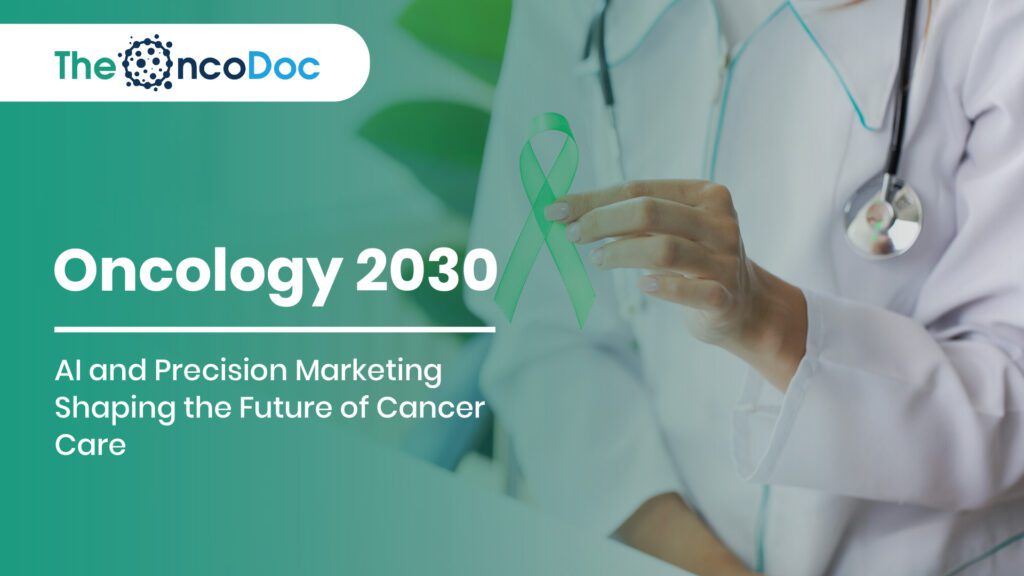Introduction: From Awareness to Intelligent Action
The oncology landscape is experiencing a seismic shift. Between 2025 and 2030, artificial intelligence (AI) will no longer be a supporting technology; it will become a cornerstone of cancer care and oncology pharma marketing. As precision medicine and computational oncology evolve, the “one-size-fits-all” model is being replaced by highly personalized, data-driven strategies. AI is enabling pharma marketers to go beyond awareness campaigns, empowering them to anticipate needs, optimize outcomes, and guide patients and providers toward actionable solutions.
The global cancer burden, coupled with rapid advances in genomic analysis, imaging, and drug discovery, is fueling unprecedented growth in AI integration. Pharma companies that strategically adopt AI-powered solutions are poised to lead not only in therapy innovation but also in building patient trust and delivering measurable health impact.
This article explores actionable trends, innovations, and strategies that will define AI-driven oncology pharma marketing in the next five years.
1. AI as the Nerve Center of Oncology Pharma Marketing
AI is evolving into a comprehensive framework for decision-making across every stage of oncology marketing, from campaign design to post-treatment engagement.
- Advanced Analytics: AI systems process massive datasets, medical imaging, genomic profiles, and electronic health records, to create actionable audience segments.
- Adaptive Content Delivery: Marketing strategies become dynamic, adjusting in real-time to patient and clinician engagement patterns.
- Predictive Campaign Planning: AI anticipates regional cancer surges based on behavioral and clinical data, allowing brands to deliver timely, targeted messaging.
2. Precision Medicine: Marketing the Era of “Me-Therapies”
The precision medicine movement transforms pharma campaigns into highly individualized experiences.
- AI-driven molecular profiling highlights unique therapy options for each patient.
- Personalized marketing communications emphasize treatment efficacy based on real-world research rather than generic claims.
- Educational tools help oncologists and patients make informed, confident decisions about therapy selection.
3. Computational Oncology’s Ascent in Marketing Strategy
Computational oncology blends mathematical modeling with AI to predict tumor behavior and treatment outcomes. Marketers are incorporating this science to:
- Simplify complex scientific insights into patient-friendly visuals.
- Train oncologists with predictive modeling tools that strengthen trust in therapy recommendations.
- Enhance brand value by demonstrating evidence-backed innovations in cancer care.
4. AI-Driven Early Detection Campaigns
AI enhances early diagnosis through imaging and pathology breakthroughs, reshaping awareness strategies.
- Medical Imaging AI: Algorithms detect anomalies in mammograms, CT scans, and MRIs earlier than traditional methods, enabling marketing campaigns focused on “actionable hope.”
- Digital Pathology: High-resolution slide analysis delivers rapid subtype classification, giving pharma marketers data to promote accurate diagnostics.
- Targeted Awareness: Educational drives highlight the role of AI in shortening time-to-diagnosis, positioning brands as health enablers.
5. Predictive Modeling in Patient Engagement
AI’s predictive algorithms are pivotal in tailoring patient journeys.
- Anticipates patient adherence challenges and triggers reminders.
- Creates personalized content pipelines, ensuring information is delivered in the right language, tone, and format.
- Informs oncologists about predicted therapy responses, strengthening confidence in treatment plans.

6. Drug Discovery and Clinical Trial Acceleration
AI is redefining pharma R&D timelines and making clinical trial promotion smarter.
- Rapid Molecule Screening: AI evaluates vast chemical libraries, reducing candidate selection time.
- Virtual Trials: Patient eligibility and recruitment are optimized using AI-based health record analysis.
- Trial Marketing Impact: Real-time dashboards allow marketing teams to communicate trial availability faster to clinicians and patients.
7. Digital Twins: Virtual Patients for Marketing Precision
A new era of oncology pharmaceutical marketing is ushered in by the development of “digital twins,” or virtual representations of patients.
- Digital twins simulate treatment scenarios, enabling precise messaging about drug efficacy.
- Pharma companies leverage this innovation to train physicians and design campaigns based on virtual trial results.
- This transparency enhances trust between pharma brands, healthcare providers, and patients.
8. Hyperpersonalized Patient Journey
Hyperpersonalization is replacing mass awareness in oncology pharmaceutical marketing.
- AI curates education paths for patients based on diagnosis stage, location, and health literacy.
- To walk patients through each stage, brands use chatbots, AI-powered video content, and multilingual SMS marketing.
- Hyperpersonalization increases brand loyalty and therapy adherence.

9. Emotional AI: Sentiment-Based Oncology Marketing
AI sentiment analysis tools measure emotional reactions to campaigns, adjusting messaging for impact.
- Real-time insights show whether survivor stories or clinical stats resonate better.
- Empathetic campaigns reduce fear and stigma, encouraging early screenings.
- Sentiment AI helps marketers avoid tone-deaf messaging, building brand authenticity.
10. AI-Powered Predictive Healthcare Campaigns
AI enables proactive marketing strategies that anticipate disease trends.
- Regional cancer risk maps identify high-prevalence zones.
- Predictive outreach campaigns deliver educational content to communities before surges.
- Marketers can target micro-communities, ensuring high ROI and stronger engagement.
11. AI-Backed Awareness for Oncologists
Pharma brands are using AI to strengthen relationships with oncologists.
- AI-curated CME (Continuing Medical Education) modules help doctors stay ahead.
- Personalized dashboards recommend the latest studies based on patient profiles.
- Pharma transforms from a supplier to a knowledge partner.
12. Multichannel Marketing with AI Orchestration
AI unifies communications for chatbots, social media, applications, and conventional outreach.
- Campaigns evolve dynamically based on engagement metrics.
- Physicians receive push notifications about new drug approvals, while patients get screening reminders.
- Consistent messaging increases trust and retention.
13. AI Integration with Wearable Devices
Wearable technology is a vital marketing tool for early detection campaigns.
- AI analyzes data from smartwatches to flag cancer risk patterns.
- Alerts trigger personalized educational campaigns, driving users to screenings.
- Brands position themselves as proactive healthcare allies.
14. Market Growth Forecast for AI in Oncology
By 2030, the oncology AI market is projected to grow to a value of over $19 billion, driven by treatment planning, diagnostics, and drug development.
- Software Platforms Dominate: Marketing campaigns promote AI’s role in diagnostics and genomic analysis.
- Regional Growth Patterns: Asia-Pacific will emerge as the fastest-growing market, while North America maintains leadership in AI adoption.
- Campaigns emphasizing global AI collaboration will resonate with both clinicians and patients.

15. Ethical AI in Pharma Marketing
Ethics will define AI-driven campaigns over the next decade.
- Algorithmic Fairness: Marketing algorithms must avoid bias, ensuring equitable access to awareness campaigns.
- Data Privacy: Patient data protection becomes a cornerstone of trust.
- Explainable AI (XAI): Pharma companies will prioritize AI transparency, helping doctors and patients understand how recommendations are made.
16. Countering Cancer Misinformation with AI
Real-time disinformation detection is possible with AI-powered social listening techniques.
· Pharma brands can deploy rapid counter-narratives with expert-backed facts.
- AI chatbots answer common myths, increasing trust and reducing harmful delays in care.
- This proactive stance positions pharma as a health guardian.
17. Gamification Enhanced by AI Analytics
AI-driven personalization is elevating gamified health tools.
- Virtual challenges incentivize communities to undergo screenings.
- AI increases engagement rates by customizing gamified features to local tastes.
- Campaign success is tracked via engagement metrics to refine strategies.
18. Pharma’s Role in AI-Backed Patient Communities
AI is redefining digital oncology communities, making them safer and more impactful:
- Sentiment-Driven Moderation: AI analyzes conversations to detect distress or misinformation, ensuring supportive, trustworthy environments for patients and caregivers.
- Seamless Access to Care: Automated tools connect members to counselors, healthcare providers, or local resources, reducing barriers to timely support.
- Community-Driven Brand Value: Pharma-backed platforms strengthen patient engagement, offering education and emotional support while positioning brands as empathetic health partners.
These AI-enabled communities go beyond marketing, building trust, fostering advocacy, and empowering patients with the right information at every stage of their cancer journey.
19. AI-Enabled Virtual Reality in Oncology Training
AI-powered AR/VR is revolutionizing oncology education while strengthening pharma branding:
- Immersive Learning Experiences: Doctors can explore drug mechanisms and tumor biology through realistic, interactive simulations, improving understanding and clinical decision-making.
- Tech-Driven Brand Leadership: Campaigns highlight these cutting-edge tools, positioning pharma companies as innovation leaders committed to advancing cancer care.
- Data-Backed Optimization: AI analyzes engagement and learning metrics to refine training modules, ensuring maximum impact and return on investment.
This blend of advanced education and marketing elevates pharma’s role, bridging science and storytelling while empowering oncologists with next-generation knowledge delivery systems.
20. Post-Treatment Engagement and Survivorship Care
AI is transforming how pharma brands support patients long after treatment ends:
- Predictive Health Monitoring: Advanced AI tools track side effects and health trends, delivering timely alerts and actionable recommendations for recovery.
- Personalized Wellness Support: Tailored content focuses on mental health, nutrition, physical rehabilitation, and lifestyle guidance, helping survivors rebuild their quality of life.
- Loyalty and Advocacy Programs: Survivor-focused initiatives strengthen emotional connections, showcasing pharma’s commitment to holistic, long-term care.
This patient-first approach builds trust, reinforces brand value, and positions pharma companies as true partners in survivorship, ensuring lasting engagement well beyond treatment milestones.
21. Pharma Marketing in the Era of Explainable AI
Explainable AI (XAI) will redefine oncology marketing, making transparency a competitive advantage:
- Clear, Trustworthy Insights: Transparent algorithms provide doctors and patients with understandable reasoning behind AI-driven recommendations, fostering confidence in both treatments and campaigns.
- Trust-Centered Messaging: Marketing strategies will focus on demonstrating AI’s credibility and reliability, helping brands stand out in a crowded market.
- Ethical Tech Leadership: By championing ethical AI practices, pharma companies position themselves as responsible innovators, earning loyalty from patients, caregivers, and healthcare providers.
XAI empowers pharma brands to merge technology with empathy, building trust-driven campaigns that resonate globally.
22. Integrated Partnerships for AI-Powered Health Access
Strategic collaborations are essential to expanding oncology care access and impact:
- AI-Driven Community Mapping: AI identifies underserved regions, helping pharma brands prioritize outreach efforts and design targeted interventions.
- Collaborative Campaigns: In addition to demonstrating contributions to lowering healthcare inequities and raising awareness of cancer, partnerships with governments, non-governmental organizations, and startups enhance brand credibility.
- Positioning as Changemakers: These alliances elevate pharma companies beyond product providers, positioning them as leaders in driving equitable access to cancer care.
By leveraging AI insights and partnerships, pharma brands can close care gaps, enhance trust, and create lasting health impact across diverse populations.
23. Market-Specific AI Messaging Strategies
AI-powered market intelligence is revolutionizing oncology pharma marketing by enabling campaigns that are deeply customized for diverse populations:
- Regional Content Localization: Advanced AI tools analyze cultural, linguistic, and behavioral patterns to create hyperlocalized messaging. Campaigns are designed to reflect regional values, preferred communication styles, and health literacy levels, ensuring that oncology awareness efforts resonate with every audience segment.
- Continuous Optimization in Emerging Markets: In rapidly growing regions, AI dynamically monitors engagement metrics, search trends, and patient behaviors to refine messaging strategies in real-time. This enables pharma brands to address unique barriers to cancer awareness, such as language diversity, stigma, or lack of healthcare access, and deliver impactful campaigns at scale.
By leveraging AI-driven insights, companies can create culturally sensitive and inclusive campaigns that enhance trust, improve accessibility, and empower patients globally. These tailored approaches will be essential for building strong relationships and increasing oncology awareness in both established and emerging healthcare markets.
24. Future of AI-Powered Oncology Pharma Marketing
The future of oncology pharma marketing will be defined by innovation that is predictive, preventive, and hyper-personalized:
- Digital Twin Simulations: AI-driven virtual patient models will allow pharma brands to simulate treatment outcomes, demonstrate drug efficacy, and build trust with both clinicians and patients through transparent data visualization.
- Emotion-Aware Campaigns: Marketing strategies will increasingly leverage AI sentiment analysis to create compassionate, empathetic messaging that resonates emotionally with patients and caregivers, fostering stronger connections.
- Real-Time Campaign Optimization: Advanced analytics will continuously track engagement and health outcomes, enabling instant adjustments to messaging, targeting, and channel strategies, ensuring maximum impact and resource efficiency.
By 2030, companies that embrace explainable AI, prioritize patient well-being, and address ethical concerns will emerge as leaders in oncology marketing. These brands will shape a new standard of trust, accessibility, and personalized engagement, transforming every campaign into a driver of better cancer care outcomes.
Conclusion: Marketing Intelligence Meets Medical Innovation
The AI revolution in oncology pharma marketing represents a paradigm shift. AI-driven strategies are making campaigns not only smarter but deeply human, enabling brands to connect meaningfully with patients, caregivers, and clinicians. From predictive modeling to explainable AI, pharma marketers are shaping an era where every campaign is a potential lifesaver.
As we move toward 2030, success will not be measured by sales metrics but by the number of early diagnoses, improved therapy outcomes, and lives saved through intelligent engagement. Pharma marketing is no longer about selling hope, it is about delivering it, powered by AI.
The Oncodoc team is a group of passionate healthcare and marketing professionals dedicated to delivering accurate, engaging, and impactful content. With expertise across medical research, digital strategy, and clinical communication, the team focuses on empowering healthcare professionals and patients alike. Through evidence-based insights and innovative storytelling, Hidoc aims to bridge the gap between medicine and digital engagement, promoting wellness and informed decision-making.



